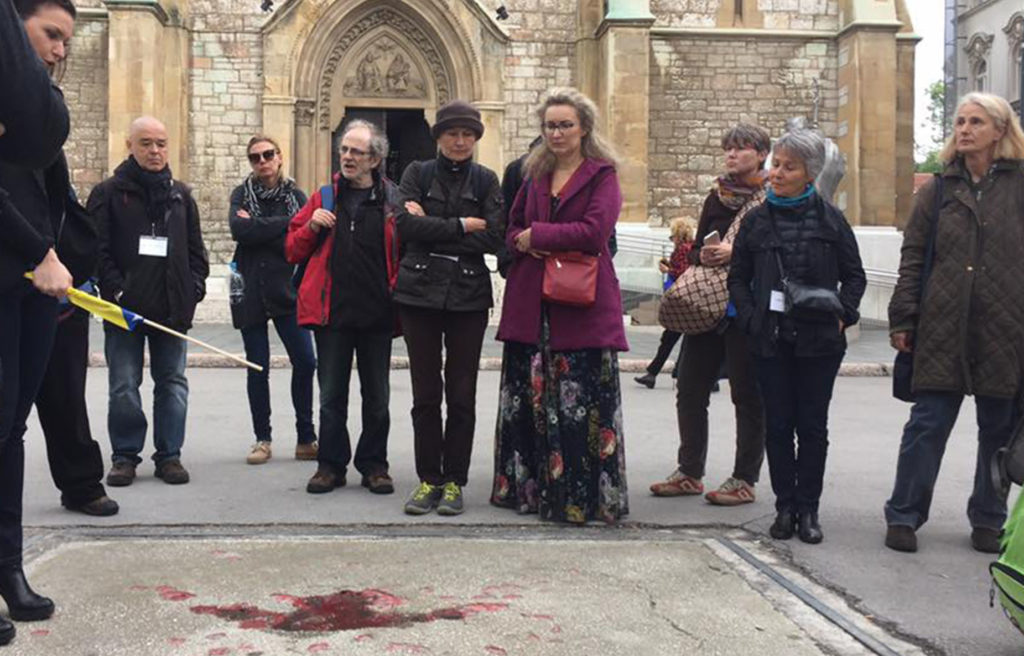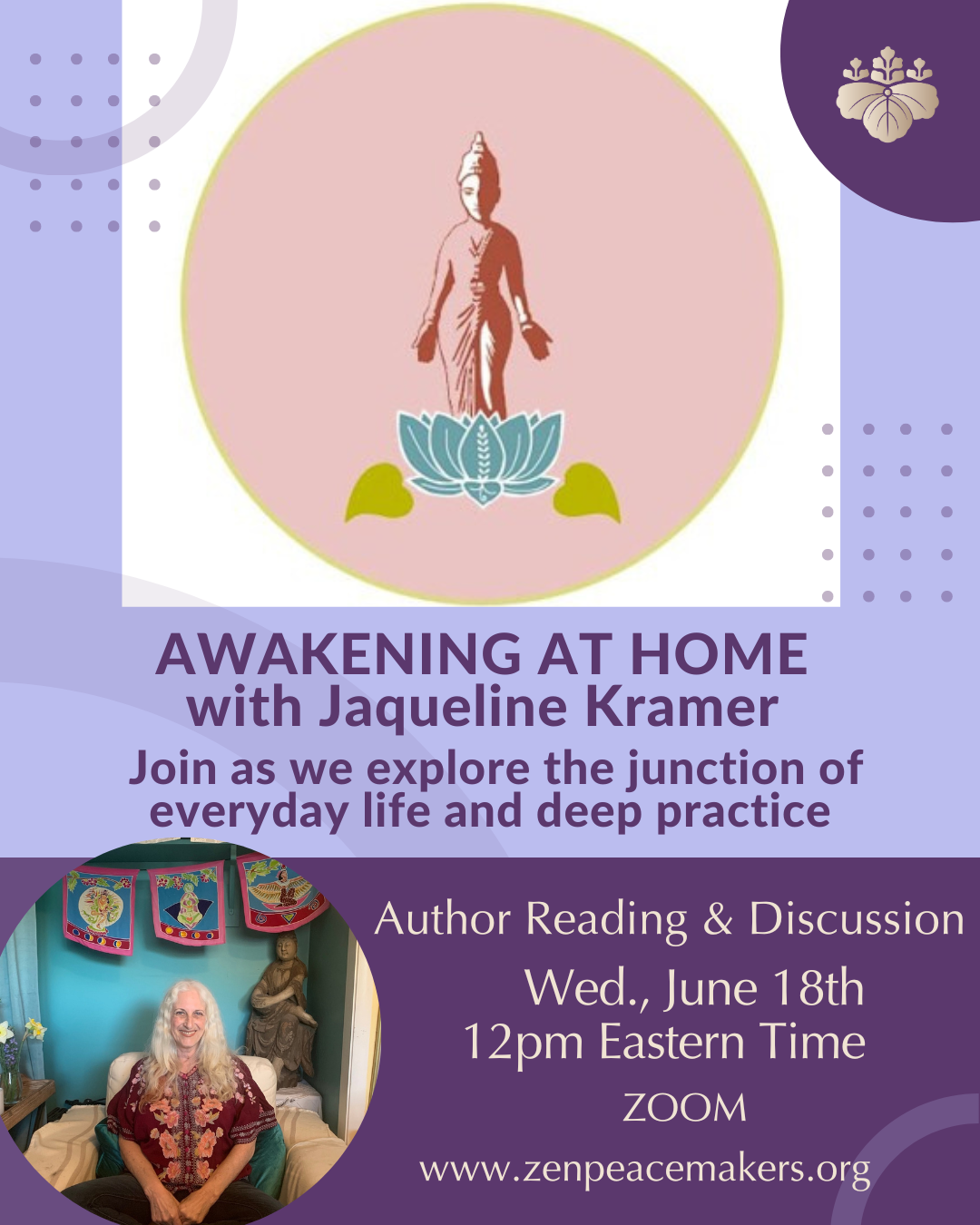Image from Bosnia-Herzegovina Bearing Witness Retreat. Participants examine a “Sarajevo Rose”: scattered around the city, these mark places where a tank shell exploded, killing three or more people. Their red resin is retouched every year to ensure the mark remains.
by Mirko Gaspari
BELGRADE, SERBIA. In late June, ahead of the yearly commemoration of the Srebrenica genocide on July 11, i gave a public talk on Zen Peacemakers’ May Bearing Witness retreat in Bosnia. The talk was given in the downtown Belgrade offices of the very active Serbian-and-regional pacifist organization called Women in Black.
An organization predominantly consisting of women, Women in Black define themselves as “pacifist, anti-militarist and feminist.” They are mostly active in the processes of “Facing Up to the Past”– confronting and accepting responsibility for war crimes committed during the Yugoslav Wars of the 1990s– and “Truth and Reconciliation” which follows from that. Acknowledgement and reconciliation for war crimes are still desperately needed in the countries and societies involved in the Yugoslav wars.
There were roughly 30 people present at the talk i gave. It was mostly WIB activists, and they seemed quite interested in the work of the Zen Peacemakers. The thing that most seemed to puzzle them – and also other activists in the region – is the Zen Peacemaker practice of treating war criminals and other perpetrators with compassion too. It often needs to be explained that this does not imply absolving war criminals of judicial responsibility or criminal prosecution, but that it offers a way of looking at and ultimately dealing with human beings who have deeply alienated themselves from their true human nature, their true humanity. Seeing war criminals with compassion is also a way of dealing with our own hate-thoughts.
Still, i’ve had conversations that tend to go:
“Well, war criminals deserve special punishment!” And then i would ask, “What would you do with them, torture them?”
“Of course not, that’s barbaric!”
“Well, would you then subject them to the death penalty?”
“Of course not, we are against the death penalty!”
“So, you would just sentence them to prison and hate them?” And so on, until they would agree that to hate anyone is futile and that hate leads peace activists to perpetrate mental states that induce the very kind of aggressive acts that they are struggling against. From this, it is just one more step to the realization that an active practice of compassion can be a very useful tool in peacemaking work. Ultimately, there was interest in how mindfulness and meditation can also be useful tools to help peace activists deal with both outer and inner aggression.
At the talk, i explained contemporary (Western) Buddhism and Zen Buddhism generally. i also explained the activities of the Zen Peacemakers in particular, with their Three Tenets, as something that not only offers a fresh perspective on peace activism, but can also become useful in their day-to-day activities.
My small organization called “The Engaged Buddhists of Belgrade” plans to partner more and more with the Women in Black on issues having not only to do with facing up to the past, but also the burning issues of Syrian and other refugees, and widespread violence against women in such a strongly patriarchal society as Serbia. i hope to get together with the Women in Black for our annual Buddhist activity against violence and body-shaming of women, called “Wash the Feet of Women.” We do this every year on March 9, International Women’s Day.
Present at the talk was the Belgrade journalist and former war correspondent Dejan Anastasijević. He works for the Serbian news weekly called “Vreme” (Time), a publication similar in content and format to the U.S. “Newsweek” and “Time” with a circulation of over 5,000, plus online readership. His story on the May 2017 Bearing Witness Retreat included an interview with me, and was released under an overall heading of “New Peace Initiatives,” in print and online on June 29, for subscribers. Since then it has been made available for free to a general online audience. You can find it here, in Serbian.
All this is just my way of “Adding a new pearl to Indras Net,” as Roshi Barbara Wegmuller put it– in the already vast, wonderful and intricate Indra’s Net that Zen Peacemakers International has been building around the world!
 Mirko Gaspari is a member of Zen Peacemakers International, living in Serbia.
Mirko Gaspari is a member of Zen Peacemakers International, living in Serbia.





1件のフィードバック
Mirko, in a such patriarchal society as are all the countries of ex Yugoslavia it could be wonderful if one day they can all reflect, women included, on widespread violence against any gender and sexual orientation that is not male and heterosexual, stretching beyond the binary division that in itself is very oppressive and discriminatory.
As a queer person I found myself many, many times being discriminated by the women, without realising that it is exactly the same mindset that is causing all the violence against them.
Best
Jozo